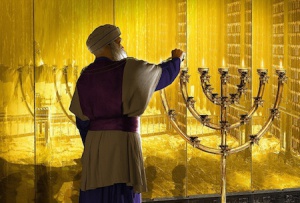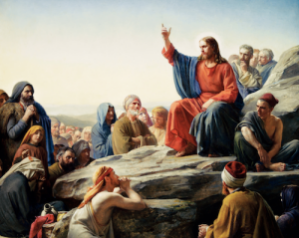Most of Jehovah’s Witnesses would no doubt vehemently disagree with the suggestion that the Watchtower Society needs a change of leadership because of their feeling of intense loyalty to the so-called faithful and discreet slave.
However, all of Jehovah’s Witnesses should likewise be in agreement that the only opinion of any weight or consequence is the considered opinion of God himself. Since none of us are in any position to directly inquire of Jehovah as to what he thinks, we must rely upon the preserved documents that reveal his thinking on matters. In that respect, God’s past dealings mirror his future judgments. To be sure, the leadership of the Watchtower Society long ago recognized that that is how the Bible works.
There are numerous instances in the history of ancient Israel where God tolerated poor leadership up to a point, and then, suddenly, made sweeping changes. The high priest Eli comes to mind most readily. He was faithful in his tabernacle service until in his old age when Eli unwisely indulged the brazen immorality and blasphemy of his sons by only weakly rebuking them with a ‘don’t do that my sons.’ Because Eli allowed his sons to show such disrespect for Jehovah, as a consequence, God had the two sons put to death and swept Eli out of office and appointed Samuel to replace him as high priest. A little while after replacing his high priest God also replaced his king – installing David and removing Saul.
While these incidents that are recorded in the Bible might establish a pattern, they are not necessarily prophetic. However, the prophets also confirm that we may expect God to act similarly in future judgments. One obscure prophecy that deals with God intervening to replace the leadership of his people is found in the 22nd chapter of Isaiah. Actually, though, there is no such thing as an obscure prophecy – only misunderstood, unappreciated, or unrealized judgments of God.
But before briefly examining a few aspects of that prophecy, we may call to mind that even Christ has foretold a day of housecleaning and change of leadership await the Christian house of God.
In the 12th chapter of Luke, verses 42-47, Jesus spoke about two classes of slaves that would be given authority over his disciples. The one slave would be judged as faithful to his assignment and the other slave would be judged as an evil slave. That both slaves wield authority over God’s spiritual house is evident by the fact that Jesus said in the 48th verse: “Indeed, everyone to whom much was given, much will be demanded of him; and the one whom people put in charge of much, they will demand more than usual of him.”
So, according to Jesus’ illustration, even the unfaithful slave is in charge up until the time of Christ’s arrival for inspection.
Now consider Isaiah 22:15-19, which pertains to God’s judgment against a certain steward named Shebna. Jehovah commands his prophet to announce his judgment beforehand, saying to Isaiah: “This is what the Sovereign Lord, Jehovah of armies, has said: “Go, enter in to this steward, to Shebna, who is over the house, ‘What is there of interest to you here, and who is there of interest to you here, that you have hewed out for yourself here a burial place?’ On a height he is hewing out his burial place; in a crag he is cutting out a residence for himself. ‘Look! Jehovah is hurling you down with violent hurling, O able-bodied man, and grasping you forcibly. Without fail he will wrap you up tightly, like a ball for a wide land. There you will die, and there the chariots of your glory will be the dishonor of the house of your master. And I will push you away from your position; and from your official standing one will tear you down.’”
Like the evil steward of Christ’s parable, Shebna has an official position over God’s house; but he is unfaithful and self-serving. Because of his unfaithfulness, Jehovah decreed that a man by the name of Eliakim should replace Shebna. Verses 21-22 say of Eliakim: “And I will clothe him with your robe, and your sash I shall firmly bind about him, and your dominion I shall give into his hand; and he must become a father to the inhabitant of Jerusalem and to the house of Judah. And I will put the key of the house of David upon his shoulder, and he must open without anyone’s shutting, and he must shut without anyone’s opening.”
The October 1, 1981, Watchtower has a detailed discussion of the above prophecy. The article nicely explains how the prophecy foretells a change of stewardship in modern times, as a prelude to Armageddon. That’s because in the ancient setting, Shebna and Eliakim served in Hezekiah’s official court at the time when the Assyrian Empire was threatening Judah. That’s the occasion when Jehovah’s angel slew 185,000 Assyrian soldiers and forced Sennacherib to end his military campaign. That occasion of Divine intervention is indeed a fore gleam of how God will vanquish the armies of the 8th king on the battlefield of Armageddon.
But, the Watchtower’s interpretation of the prophecy identifies Shebna as the clergy of Christendom and Eliakim is, of course, identified as the faithful slave associated with the Watchtower Society and Jehovah’s Witnesses. The article refers to 1918-1919 as the time when God supposedly judged his house and removed the unfaithful steward from his office of responsibility over God’s people. However, there are several problems with that interpretation.
The first difficulty is that the Watchtower connects Shebna to the clergy by reason of the fact that the clergy claim to serve Christ. The Watchtower article says:
Like Shebna in King Hezekiah’s government during Isaiah’s time, there are religious clergymen of Christendom who claim to have the exclusive right to the earthly stewardship under the Greater Hezekiah, Jesus Christ.
But, here’s the problem: Shebna did not merely claim to have an office of stewardship; he actually did have an official position as secretary in Hezekiah’s royal court. That is why Jehovah undertook to officially unseat him from his position. If there is a modern parallel, how could Jehovah possibly recognize clergymen from the hundreds of squabbling sects of Christendom as having any sort of official position over his anointed servants?
The second problem with this particular interpretation is that it supposes that the Master interceded in 1919 to exalt the Eliakim class of the faithful steward over all of his belongings. That simply is not possible. According to Christ’s own account of the faithful slave, the slave is not rewarded until the Son of man arrives. Matthew 24:42-47 clearly situates the arrival of Christ to a time still in our future. That span of verses read: “Keep on the watch, therefore, because you do not know on what day your Lord is coming. But know one thing, that if the householder had known in what watch the thief was coming, he would have kept awake and not allowed his house to be broken into. On this account you too prove yourselves ready, because at an hour that you do not think to be it, the Son of man is coming. Who really is the faithful and discreet slave whom his master appointed over his domestics, to give them their food at the proper time? Happy is that slave if his master on arriving finds him doing so. Truly I say to you, He will appoint him over all his belongings.”
If the Son of man arrived in 1914 and has already concluded his judgment then there is really no longer any need for anyone to keep on the watch, is there? And, if the Master has already judged God’s household and expelled the evil slave, why then are there more problems now then ever before? (This article was originally written in 2003. But Jehovah’s Witnesses ought to ponder the implications of the Watchtower’s latest revision of prophecy regarding the faithful slave being appointed over all the master’s belongings in the future. In resetting that appointment the Watchtower has cleverly dissolved the possibility of any sort of evil slave class being exposed in the future. No wonder Jesus posed the question ‘who really is the faithful and discreet steward?’)
If we hope to interpret God’s Word correctly, we must come to terms with the fact that, according to the illustration Jesus spoke, the evil slave holds authority over his fellow slaves up until the moment that the master of the house makes his surprise inspection. That is in harmony with Jesus’ related illustration about the wheat and weeds growing together until the harvest, during the actual conclusion, when the angels make a final separation. Up to the present Jehovah’s Witnesses have always understood the evil slave to be outside the congregation. But if we are honest in our reasoning, it is apparent that the evil slave and the faithful slave coexist in the same household up until Christ arrives and initiates the judgment period.
The problem is that Jehovah’s Witnesses simply cannot recognize the evil slave in their midst. However, Jehovah is not under any sort of deluding influence.
Returning to the prophecy in the 22nd chapter of Isaiah: Perhaps the most obvious shortcoming in the Watchtower’s present interpretation of the prophecy is that the setting in which the prophecy is fulfilled has to do with the fall of Jerusalem. What is interesting is that Shebna and Eliakim were actual persons living during the time of Isaiah, during which time, as mentioned, the Assyrian Empire conquered Israel and was moving to subdue Judah and Jerusalem.
Verses 1-11 foretell the actual siege conditions of the city. Yet, as the 37th chapter of Isaiah records, Jehovah intervened and spared Jerusalem on that occasion. Shebna and Eliakim are even mentioned in connection with confronting the Assyrian envoys who demanded that Jerusalem capitulate to Sennacherib. The Watchtower recognizes that the prophecy does not seem to have had a literal fulfillment back then, as the Isaiah commentary states this:
In Isaiah chapter 22, we read about such a siege—a siege against Jerusalem. When does it happen? It is difficult to pinpoint any one siege in which all the features described are fulfilled. Evidently, the prophecy is best understood as a generic description of the various sieges that will befall Jerusalem, a general warning of what lies ahead.
The fact that the prophecy did not completely apply to the time of Shebna and Eliakim is a sure indication that although the prophecy was set in a primitive setting, the real application has to do with the Christian organization. How may that be determined?
For one thing, the language used in describing Eliakim’s office relates to Christ’s kingdom. Specifically, the 22nd verse states: “And I will put the key of the house of David upon his shoulder, and he must open without anyone’s shutting, and he must shut without anyone’s opening.”
The house of David is, of course, Christ’s heavenly kingdom. Bible students will also recognize that a similar phrase was used at Revelation 3:7 to describe Christ’s authority over the congregations. It reads: “These are the things he says who is holy, who is true, who has the key of David, who opens so that no one will shut, and shuts so that no one opens.”
Eliakim must therefore represent the same group of anointed Christians who are pictured in Revelation as existing during the Lord’s day, for whom Christ opens a door of special privileges during the tribulation—referred to a few verses down as “the hour of test, which is to come upon the whole inhabited earth.”
Another interesting aspect of the prophecy is found in the first few verses, which read: “With turmoil you were full, a boisterous city, an exultant town. Your slain ones are not those slain with the sword, nor those dead in battle. All your dictators themselves have fled at one time. Without need of a bow they have been taken prisoner. All those of you who have been found have been taken prisoner together. Far off they had run away.”
Jesus also foretold that the city of God, Jerusalem, would be besieged during the conclusion of the system. And he specifically said that it was for the purpose of “meting out justice, that all the things written may be fulfilled.”
Revelation 11:2 specifically connects the holy city to the Christian congregation. That being the case, the prophecy of Isaiah 22 is apparently describing the very thing that Christ foretold concerning the desolation of Jerusalem in order “that all the things written may be fulfilled.”
One thing is for certain: It is definitely no ordinary siege where those who fall in battle are not slain with a bow or sword. In that respect the prophecy may be foretelling how a large part of God’s people will give way to fear and will be taken captive, as it were, by giving out in their faith. Apparently, the dictators are the spiritual leaders who abandon the flock during the time of calamity. That is why the prophet is inconsolable, saying in the 4th and 5th verses: That is why I have said: “Turn your gaze away from me. I will show bitterness in weeping. Do not you people insist on comforting me over the despoiling of the daughter of my people. For it is the day of confusion and of downtreading and of confounding that the Sovereign Lord, Jehovah of armies, has in the valley of the vision.”
It is in that setting then – during the tribulation – that Jehovah pushes Shebna (who pictures the evil slave today) away from his position and “official standing” in God’s house and provides new leadership under the sons of God—yet to be revealed.



